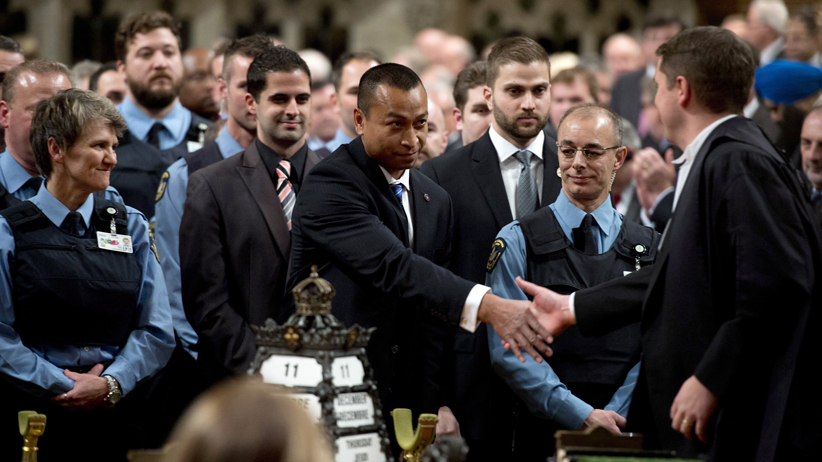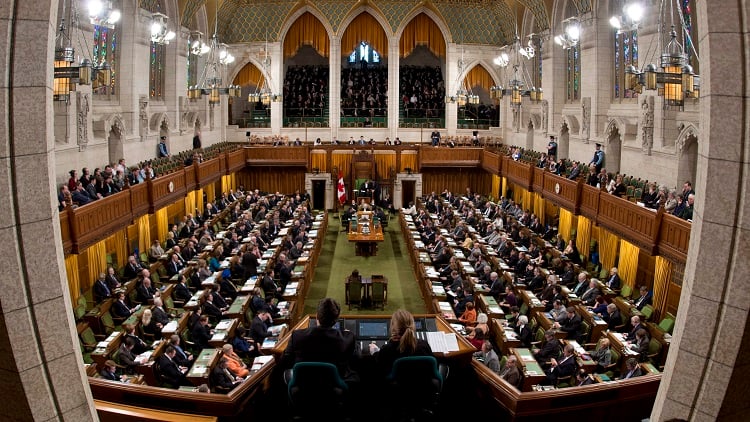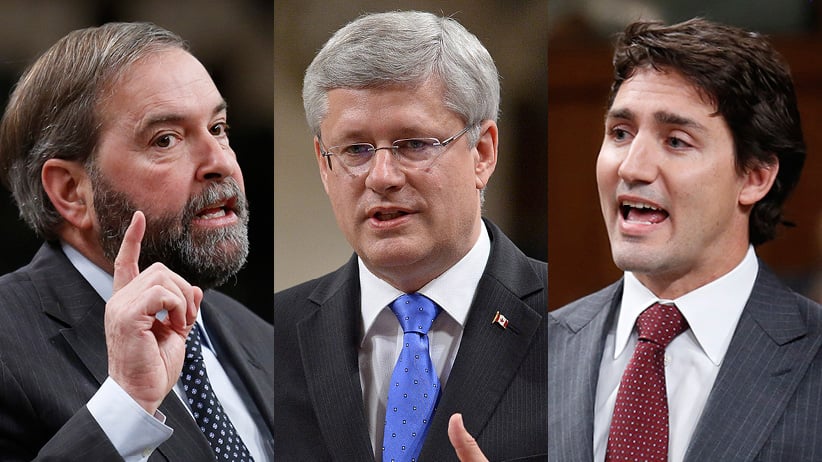The greatness, tragedy and humanity of the 41st Parliament
The epic parliament
Aaron Wherry
Share

Samearn Son stood before the Speaker—Norah, Kianna and Kody, his wife, his four-year-old daughter and his 16-month-old son, watching from the first row of the official galleries—and he and the others were officially thanked and the officers filed out to applause as they had filed in. And now Son, after accepting the handshakes of the grateful and a hug from Hedy Fry, was the last to leave. And just then Son came to the spot at the far end of the room where the sergeant-at-arms keeps watch. There, with his collar of esses around his neck and a sword at his side, Kevin Vickers stood tall to give Son a crisp and dramatic salute.
The room roared.
It roared like it had when Vickers had come in on the morning of Oct. 23, the day after a madman had fired two bullets into Cpl. Nathan Cirillo and another into Samearn Son and then died a miserable death at the threshold of the library of Parliament, the beautiful and quiet sanctuary of Centre Block.
Where Son and Vickers were cheered this fall was where, this past spring, the members of the House of Commons of the 41st Parliament comforted each other upon learning of Jim Flaherty’s sudden death.
And through the grand wooden doors, in the marble foyer, was where, two years and four months ago, they lay the casket bearing Jack Layton’s body and the mourners formed a line that wound down the Hill and around East Block.
From the morning of June 2, 2011, when the House was convened to choose a new Speaker, to the afternoon of two Fridays ago, when it adjourned for the holiday season, the 41st Parliament has seen death and terror and life. Four women elected as New Democats—three currently in caucus, one estranged—became mothers. Peter Kent and Keith Ashfield have battled cancer. The Human Resources Minister lost her husband, himself a senator and one of the principal architects of the current Prime Minister’s power. The Transport minister, the interim leader of the Liberal caucus and the MP for Saint-Hyacinthe–Bagot came forward to discuss their respective experiences with mental illness. Romeo Saganash battled alcohol and his own demons. Ted Hsu and Frank Valeriote decided to step away for the sake of their families.
The House of Commons of the youngest MP in history elected the youngest Speaker in its history. It is the Parliament of the McGill Four and the fairy tale of Ruth Ellen Brosseau. But it is also the Parliament of Patrick Brazeau’s fall and Pamela Wallin’s travel expenses. Olivia Chow quit to pursue a different dream. Peter Penashue quit in an ill-fated pursuit of redemption. Paul Calandra and Dean Del Mastro choked up. After everything of that morning of Oct. 22, there were hugs. And now Mike Duffy could go to prison. Mac Harb too. And still lingering are the misconduct allegations involving two Liberals and two New Democrats, not to mention the larger questions thus raised about the basic culture of Parliament Hill as a place of work.
All of which is to say almost nothing about what we sent 308 human beings to Ottawa in 2011 to actually do.
To describe this 41st Parliament as historic would be to both state the obvious—insofar as every convening of the national legislature is of some historical significance—and guess as its lasting significance. It is also not nearly over—some 76 sitting days still between us and the next election. But we might at least guess now at how it will be remembered.
For better or worse, demonstrating sickness or health, it has debated war, democracy, climate change, taxation, justice and governance. The 41st Parliament has covered the basics and the profound. It has not always been pretty, but pretty is probably not the goal the fathers of Confederation had in mind when they signed us up for this system of two-swords length.
If competition is something like the principled goal, the 41st Parliament might be at the centre of one of the great moments in our democratic history: the emergence of a true three-way fight leading into what could be the most competitive federal election we’ve ever been blessed with. When the writs are signed next fall, it seems likely that three parties, each having raised impressive sums of money, will have some plausible path to government. It’s entirely reasonable to imagine a 42nd Parliament with each of those parties holding more than 70 seats. The emergence and lingering strength of the NDP—with the corresponding collapse of the regional troublemaker Bloc Québécois—is largely to credit for this new situation, but so is the revival of the Liberal party and the resilience of the Conservative brand.
For all its members have experienced and witnessed, this Parliament might thus be primarily about three men and their competing claims to the present and future of this country. The House has perhaps one of its most formidable leaders of the Opposition and has maybe never had a more popular or intriguing leader of the third party, and both pursue a Prime Minister who can reasonably claim to be one of the most effective political leaders in this country’s history (one does not become the sixth-longest serving prime minister by mere luck or happenstance). Thomas Mulcair, proudly tough and unrelenting, would be the first New Democrat to occupy the Prime Minister’s Office and thus the first leader to break through the two-party dominance of the Liberals and Conservatives. Justin Trudeau, heartful and talented and blessed of mythic lineage, would be the first person to lead a party from third-place to first in a single go and the first son of a prime minister to repeat his father’s feat. Either could, without “winning” in the classical sense, end up leading some kind of co-operative government with the other’s assistance. Only a clear defeat would prevent Stephen Harper, methodical and unsentimental, from becoming just the third man, and the first in more than a century, to lead his party to four consecutive mandates. Though anything less than a majority would surely precipitate his exit, throwing his party into the great uncertainty of a leadership contest.
Between these three men are good questions, if asked only implicitly, about the shape and purpose of government and the future of our politics. And the settling of such could make for a particularly remarkable election of particularly great consequence.
Pity then that our political system is failing us so woefully.
This past year saw the release of two books intended to demonstrate as much: Tragedy in the Commons and Irresponsible Government, respectively subtitled “Former Members of Parliament Speak Out About Canada’s Failing Democracy” and “The Decline Of Parliamentary Democracy in Canada,” the latter penned by a current MP.
The implicit promise of our setup is that, for all the shouting and inanity and nonsense, in convening 308 of our fellow human beings and setting them against each other we will ultimately arrive at a worthy result. That is still basically true of our elections. But on many days in between it is difficult to believe that the promise is being fulfilled.
By certain measures, we have done fine by our politics. You are better off living here than, say, Russia. And it is always better to lament for a democracy than to live under a dictator. But beyond not imperilling our status as a functioning liberal democracy, to what extent can the 41st Parliament claim to be successful? By what measure was this a good year for the cause of parliamentary democracy in Canada?
Two more omnibus budget bills passed the House, 850 pages of legislation subject to only the faintest input from the legislature. Twenty six motions of time allocation were passed at the government’s behest, meaning at the very least that the members of the House of Commons spent something like 26 hours debating and voting on how much time they should spend debating the government’s bills. A motion to impose some small standard of relevancy on the government’s responses in question period was defeated. The fall economic update was again presented to a paying audience while the House was adjourned. Six months after Conservatives voted to reject a demand that the Prime Minister appear before a House committee to explain the events around Nigel Wright’s payment to Mike Duffy, a government minister moved an order to have the leader of the Opposition testify at a House committee about the NDP’s use of House funds.
Moments before the House adjourned for the holidays a week and a half ago, the Conservatives sent up a dutiful backbencher to ask the Government House leader to expound on the greatness of the parliamentary system.
“Mr. Speaker, around the world, we see economies struggling and political gridlock paralyzing decision-making. Last night, we saw a gridlock in the U.S. Congress bring the American government to the verge of a shutdown that was averted only at the last minute,” the dutiful backbencher observed.
“On this last sitting day of 2014, can the Leader of the Government in the House of Commons tell us how our Parliament’s productive, hard-working, and orderly approach contrasts with the economic uncertainty, political gridlock, and paralysis we see outside of Canada?”
It is tempting here to mock the simple act of the Conservatives, the party of an elected Senate, choosing to sneer publicly at the inefficiency of a democracy with two fully empowered chambers. But let us set aside that brush with self-parody to deal with the substance of the argument made here.
“Mr. Speaker, job creation, lower taxes, and free trade were key elements of our government’s economy-focused agenda this year. We built on our record of creating over 1.2 million net new jobs. We doubled the children’s fitness tax credit to $1,000. We expanded the universal child care benefit to $160, up from $100 a month,” Peter Van Loan enthused. “We delivered free trade with South Korea and Honduras, and a massive new trade deal with Europe. We moved to tackle crime, protect victims, support veterans, strengthen the value of Canadian citizenship, cut red tape, and fight terrorism. Canadians can see clearly that running this country is a serious job, one that requires strong leadership.”
All right then, let us be serious.

First and foremost, the value of a parliament cannot be measured in the number of widgets it produces. It is not a bill-passing factory. For that matter, I imagine most successful factory operators understand that it is not merely the number of things that are produced, but the quality of those things—something that, I presume, requires robust systems of testing and assurance.
A parliament can only be measured by how well and how seriously it holds the government to account and how fully and seriously it approaches the relevant challenges of the moment. However many ministers and parliamentary secretaries are put on the public payroll, they are always outnumbered by the MPs whose mandate is something like quality control. It is the government’s responsibility to govern, it is everyone else’s responsibility to challenge and test and scrutinize the government’s proposals. And it is through Parliament that we should hope to clarify and explore the issues and ideas of the day. A government that is truly accountable to the members of that Parliament should result in decent widgets.
We might hope that efforts at changing our laws of election would not result in savage arguments and a minister of the Crown publicly questioning the credibility of the chief electoral officer. We might hope, more generally, to see more frequent examples of bipartisan accomplishment.
But the first concern is accountability, and on that score this factory is not well-regarded.
“Under the constitutional convention of responsible government, the government is accountable and responsible to the Parliament of Canada,” Brent Rathgeber explained quite simply in Irresponsible Government. “Yet the Canadian Parliament, including al of its constituent elements, is failing miserably in its constitutional obligation.”
At the close of 2014, we do not really have any kind of clear idea what is going on at the department of Veterans Affairs. It might be nice and useful if the minister and his department were either willing or capable of explaining the situation to members of the press, but ultimately it is Parliament’s responsibility to demand answers. And if we do not have answers, it’s necessary to ask why Parliament has been so unable.
We do not presently have anything like a useful debate on how our national government could or should participate in a global effort to stave off the worst possibilities of climate change. Regardless of what sort of planet we leave them, our grandchildren will probably be rather unimpressed when they see how we discussed their future.
The most comprehensive analysis of the government’s controversial policy on health care for refugee claimants was authored this year by a Federal Court judge. But that ruling didn’t initiate parliament hearings. Nor did a national controversy over the Temporary Foreign Workers program convince the human resources committee to study the issue.
Two Supreme Court justices were appointed without parliamentary hearings after the government decided it didn’t want to bother with even the veneer of scrutiny.
The Justice minister declined to provide a legal opinion from the Justice department in support of the government’s prostitution legislation.
The Defence minister refused to provide an estimate of the cost of the military mission in Iraq.
In the 2013-14 fiscal year, the federal government complied with just 55 per cent of the parliamentary budget officer’s requests for information.
The Access to Information system remains unreformed.
The Finance minister acknowledged to the Finance committee that he didn’t know how many jobs would be created by a measure proposed to create jobs and an economist told the same committee that the children’s fitness tax credit wasn’t doing much to increase the fitness activity of children and the legislation to implement the former and double the latter was probably never really in any danger of not passing.
The Prime Minister can’t summon the courage to fill the vacancies in the Senate and the Senate couldn’t summon the courage to fix an error in a Conservative MP’s bill.
Three years after the government eliminated the long-form census, the extent of the parliamentary debate on the ramifications is a private member’s bill that will receive just two hours of consideration in the House before a vote this spring.
We don’t have federal budgets anymore, we have an annual Economic Action Plan™. And this year was tabled the Common Sense Firearms Licensing Act. Presumably because ministers can’t be trusted to sufficiently convey the merits of their own legislation or because the most effective way to reach out to voters is to imagine you’re marketing sugary cereal to a six-year-old.
And at its most watched, between the hours of 2 p.m. and 3 p.m. from Monday through Thursday, the House of Commons is too often the stuff of boring pro-wrestling promos and uninspiring TV pitchmen.
Against all that, something like the Reform Act can seem both small and tantalizing.
Of course, question period’s basic existence is still a credit to the democracy we’ve built for ourselves. All of our Parliament is, really.
It has perhaps never felt better to be there than it did the day after that terrible morning. And there was surely no sweeter moment this year than the following Friday night when Parliament Hill was opened again to the public. That’s because of what this place is and what it represents and what it meant for those things to be attacked.
And yet it and its occupants are apparently failing us.
The humanity of the House that roared has been vivid and loud. The greatness is in the contest of these human beings. The trouble appears when you think about how things are and how things could or should be.
The 41st Parliament is an epic story of all that.
